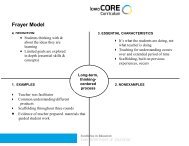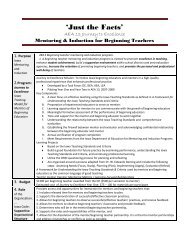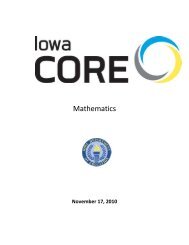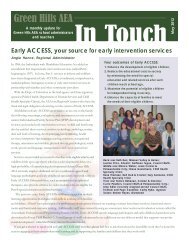The Arc's Self-Determination Scale: Procedural Guidelines
The Arc's Self-Determination Scale: Procedural Guidelines
The Arc's Self-Determination Scale: Procedural Guidelines
Create successful ePaper yourself
Turn your PDF publications into a flip-book with our unique Google optimized e-Paper software.
emediative in nature, this is hardly surprising. It is particularly<br />
important for adolescents to focus on developing their strengths so<br />
that they can accomplish more in these areas. Lipsky and Gartner<br />
(1989) pointed out that if universities adopted the same structure<br />
that the special education process uses, college students would<br />
enter university and spend four years trying to improve, even<br />
slightly, on the activities and subjects they have the most trouble<br />
doing, while basically ignoring areas of strengths and interests.<br />
Secondary special education programs should adopt, instead, the<br />
model used in postgraduate education, where students focus almost<br />
exclusively on their strengths and interests and attempt to utilize<br />
these skills to their benefit.<br />
Why is <strong>Self</strong>-<strong>Determination</strong> Important?<br />
People with disabilities have made it clear that self-determination<br />
is an outcome that is important to them. Williams (1989) stated<br />
“We want it [self-determination as a complete way of life] not just<br />
for ourselves but for all people with disabilities. Indeed, we want<br />
it for all people -- period. And, we want it now” (p. 16). Kennedy<br />
(1993) said that “what people need to realize is that selfdetermination<br />
can be different things to different people. All<br />
people should have the opportunity to be self-determining, based<br />
on what that means for them” (p. 11). It is not difficult to<br />
understand that when a person has limited control and choice in his<br />
or her life, the reclamation of such control and choice becomes an<br />
issue of intense importance.<br />
In our opinion, the call for self-determination by people with<br />
disabilities is, in and of itself, sufficient justification for focusing<br />
on this outcome. However, there are other reasons that it is<br />
important to focus limited resources, including time, personnel and<br />
money, to achieve self-determination for individuals with<br />
disabilities. <strong>The</strong>se reasons include the importance of selfdetermination<br />
to experience an enhanced quality of life and<br />
integration into one’s community and recent findings concerning<br />
adult outcomes for people with disabilities.<br />
<strong>Self</strong>-<strong>Determination</strong> and Quality of Life<br />
We have opted to frame causal agency within the concept of<br />
quality of life because we believe that, along with its historical ties<br />
to the empowerment movement, self-determination is associated<br />
with quality of life issues. Schalock (1990) provided six<br />
fundamental quality of life principles: 1) Quality of life for persons<br />
with disabilities is composed of those same factors and<br />
relationships that are important to persons without disabilities; 2)<br />
40
















